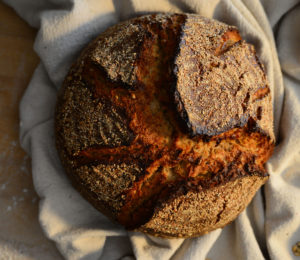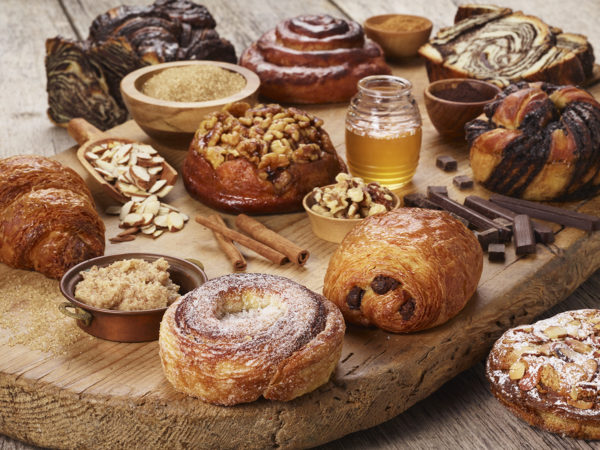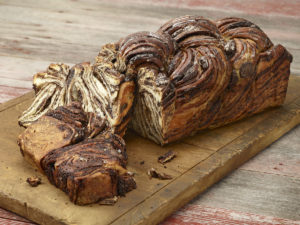Now rising at a Golden-based bakery: retail sales.
Grateful Bread, known for its ciabatta and sourdough, saw business pick up in January and February after roughly breaking even in 2019. Then, the pandemic hit.
The bakery, run by husband-and-wife duo Jeff Cleary and Kathy Mullen, primarily sells wholesale to restaurants, which have cut back orders drastically along with arenas like the Pepsi Center — its biggest account. Grateful Bread’s wholesale business has been sliced about 50 percent from pre-pandemic levels, though that’s up from an 85 percent drop in March.
But the bakery also sells directly to hundreds of customers every Saturday from 10 a.m. to 2:30 p.m. and has since 2011, three years after it opened.
Retail revenue has roughly doubled, Mullen said, because people have craved the high-quality pastries and bread, which range from $3.75 to $7, during the lockdown. Word has spread, thanks in part to an email newsletter that’s grown its reach by about 28 percent, to 3,600 from 2,800, since the pandemic.
“When the shutdown first started, we were concerned because we had no idea how many people would show up — if anyone would show up,” Mullen said. “(But) we were flooded with customers. There was a huge line. Everyone was standing six feet apart and the line went all the way down to the end of our (375-foot) building. You couldn’t even see the people at the end — that’s how far it was.”
Grateful Bread doubled down on safety measures, like allowing six or fewer customers in its retail room at a time. Mullen said she rushed to buy masks along with a ticket dispenser, tent, megaphone and floor decals when the pandemic hit. Customers now wait in cars after securing a ticket number, which is later called via a megaphone and put on a large whiteboard to alert them their order is ready.
“It’s like a carnival out there in the mornings,” Mullen said, adding some customers set up lawn chairs while waiting when the weather’s nice. “It’s crazy. People get there at 8:30 … we don’t open until 10.”
That strong demand kept the lights on and its employees paid before government assistance kicked in. On the first Saturday of October, Mullen said sales hit all-time highs of 312 people served and 2,700 items sold in its 4.5-hour window.
Cleary and Mullen are brainstorming new ways to reach customers. One idea they have is teaching baking and cooking classes twice a month in their recently built-out kitchen. The couple said more than 550 people have expressed interest so far via email, which they added would be over a year’s worth of classes. They’re planning on reaching out to those interested in learning to make sourdough, croissants and pasta after deciding on a price.
The couple is also considering selling to grocery stores they’ve been approached by, which would be a new strategy to adapt to the downturn of local restaurants. They added that this is the first time in about a dozen years that they haven’t had a waiting list on the bakery’s wholesale side, as it typically turns down hundreds of interested partners due to a lack of labor and supply.
Grateful Bread’s roots stem from Intrigue, a restaurant Cleary and Mullen said they used their life savings to open in late 2002. Cleary, a lifelong cook with a culinary degree, baked all the restaurant’s bread in a small space in the restaurant before the restaurant started to struggle in early 2003 after Denver’s economy slowed. The two sold the restaurant in 2005, and Cleary doubled down on baking.
A wooden baking table, a 20-quart mixer and a six-tray electric oven were the tools Cleary brought to a 400-square-foot cabin he rented in Evergreen. He said he spent 2006 working over 110 hours a week for a year in his new bakery, single-handedly handling mixing, baking and doing sales, deliveries and orders while Mullen worked multiple jobs to make ends meet.

A loaf of Scottish Peat Smoked Barley & Rye made with freshly milled organic rye. (Rachel Adams photo)
The nascent bakery was outgrowing its space by 2008, which was about the time Mullen got laid off from her office job. She quickly found new work with her husband as the two quintupled their workspace to a 2,000-square-foot set-up in Golden before expanding twice more to 8,000 square feet.
Profitability didn’t come overnight for the couple, and challenges came even after making it in the black.
Grateful Bread battled a baker shortage in 2018, as the couple said they had to close then for three weeks to hire and train staff after falling from 21 bakers working around the clock to four. That number has since rebounded to 12 after many qualified bakers became available after getting laid off this year. Finding enough qualified bakers to keep pace with demand is the biggest challenge, the couple said.
Growth came primarily via word of mouth, as Mullen said her husband has carved out a niche in the Denver bakery space as more capable than smaller outfits but less processed than larger automated bakeries. The couple is confident their bread will continue to rise above the competition.
“People have never said they prefer someone else’s bread,” Mullen said. “Jeff and I feel grateful just to have loyal customers.”
Now rising at a Golden-based bakery: retail sales.
Grateful Bread, known for its ciabatta and sourdough, saw business pick up in January and February after roughly breaking even in 2019. Then, the pandemic hit.
The bakery, run by husband-and-wife duo Jeff Cleary and Kathy Mullen, primarily sells wholesale to restaurants, which have cut back orders drastically along with arenas like the Pepsi Center — its biggest account. Grateful Bread’s wholesale business has been sliced about 50 percent from pre-pandemic levels, though that’s up from an 85 percent drop in March.
But the bakery also sells directly to hundreds of customers every Saturday from 10 a.m. to 2:30 p.m. and has since 2011, three years after it opened.
Retail revenue has roughly doubled, Mullen said, because people have craved the high-quality pastries and bread, which range from $3.75 to $7, during the lockdown. Word has spread, thanks in part to an email newsletter that’s grown its reach by about 28 percent, to 3,600 from 2,800, since the pandemic.
“When the shutdown first started, we were concerned because we had no idea how many people would show up — if anyone would show up,” Mullen said. “(But) we were flooded with customers. There was a huge line. Everyone was standing six feet apart and the line went all the way down to the end of our (375-foot) building. You couldn’t even see the people at the end — that’s how far it was.”
Grateful Bread doubled down on safety measures, like allowing six or fewer customers in its retail room at a time. Mullen said she rushed to buy masks along with a ticket dispenser, tent, megaphone and floor decals when the pandemic hit. Customers now wait in cars after securing a ticket number, which is later called via a megaphone and put on a large whiteboard to alert them their order is ready.
“It’s like a carnival out there in the mornings,” Mullen said, adding some customers set up lawn chairs while waiting when the weather’s nice. “It’s crazy. People get there at 8:30 … we don’t open until 10.”
That strong demand kept the lights on and its employees paid before government assistance kicked in. On the first Saturday of October, Mullen said sales hit all-time highs of 312 people served and 2,700 items sold in its 4.5-hour window.
Cleary and Mullen are brainstorming new ways to reach customers. One idea they have is teaching baking and cooking classes twice a month in their recently built-out kitchen. The couple said more than 550 people have expressed interest so far via email, which they added would be over a year’s worth of classes. They’re planning on reaching out to those interested in learning to make sourdough, croissants and pasta after deciding on a price.
The couple is also considering selling to grocery stores they’ve been approached by, which would be a new strategy to adapt to the downturn of local restaurants. They added that this is the first time in about a dozen years that they haven’t had a waiting list on the bakery’s wholesale side, as it typically turns down hundreds of interested partners due to a lack of labor and supply.
Grateful Bread’s roots stem from Intrigue, a restaurant Cleary and Mullen said they used their life savings to open in late 2002. Cleary, a lifelong cook with a culinary degree, baked all the restaurant’s bread in a small space in the restaurant before the restaurant started to struggle in early 2003 after Denver’s economy slowed. The two sold the restaurant in 2005, and Cleary doubled down on baking.
A wooden baking table, a 20-quart mixer and a six-tray electric oven were the tools Cleary brought to a 400-square-foot cabin he rented in Evergreen. He said he spent 2006 working over 110 hours a week for a year in his new bakery, single-handedly handling mixing, baking and doing sales, deliveries and orders while Mullen worked multiple jobs to make ends meet.

A loaf of Scottish Peat Smoked Barley & Rye made with freshly milled organic rye. (Rachel Adams photo)
The nascent bakery was outgrowing its space by 2008, which was about the time Mullen got laid off from her office job. She quickly found new work with her husband as the two quintupled their workspace to a 2,000-square-foot set-up in Golden before expanding twice more to 8,000 square feet.
Profitability didn’t come overnight for the couple, and challenges came even after making it in the black.
Grateful Bread battled a baker shortage in 2018, as the couple said they had to close then for three weeks to hire and train staff after falling from 21 bakers working around the clock to four. That number has since rebounded to 12 after many qualified bakers became available after getting laid off this year. Finding enough qualified bakers to keep pace with demand is the biggest challenge, the couple said.
Growth came primarily via word of mouth, as Mullen said her husband has carved out a niche in the Denver bakery space as more capable than smaller outfits but less processed than larger automated bakeries. The couple is confident their bread will continue to rise above the competition.
“People have never said they prefer someone else’s bread,” Mullen said. “Jeff and I feel grateful just to have loyal customers.”




Leave a Reply